Success Stories |
Success and the Subud Experience: A Look at the Presentations at the Puebla Subud World Congress. |

One very well attended program at the Subud World Congress in Puebla was the “Subud Success Panels,” a series of speeches by diverse Subud members from around the world. The members told some of the stories of their lives and how the guidance they received had affected their careers and personal lives. The organizers of the Panels hope that other Subud events will similarly host programs wherein Subud members speak about the impact of the latihan on their work and lives. Harris Smart, a Subud member from Australia listened to tapes of the speakers and wrote the below assessment of the event.
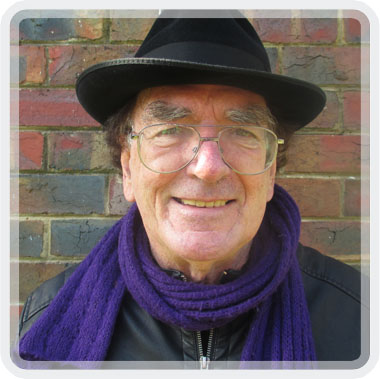
“My advice? When the spirit moves you, you better move. Follow your passion, follow what excites you. Don’t wait until you have enough knowledge or power. Just start. That’s the first and hardest step. With hard work and the right intention good things will follow.” - Harris Smart
The quote above is just one of many nuggets of good advice to be found in 23 talks which were given at the Puebla Subud World Congress on the theme of success.
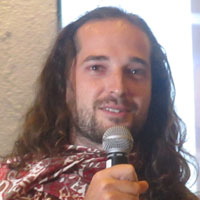
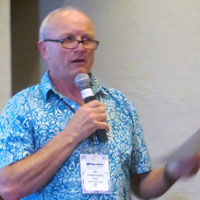
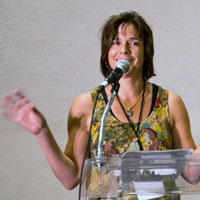
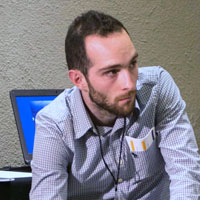
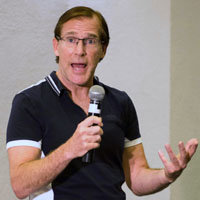
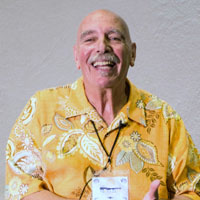
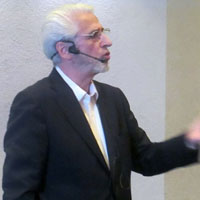
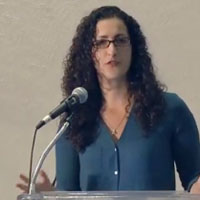
Subud Success Stories was an initiative begun by Rahman Connelly and Steven Bryson-Haynes, the Australian National SES Co-ordinator, at the Subud Australia Congress in 2014. They arranged for a series of people who had enjoyed some degree of vocational success in their lives to come along and talk about it. The series was a “success.” The talks were well attended and found to be enjoyable and valuable.
Kenneth Clark, a lawyer from the USA, was present at that Australian Congress and he became involved in developing the concept, and making the contacts, to present an expanded version of the program at the World Congress in Puebla. The team grew to include Livingston Armytage and Rosanna Hille along with Rahman, Kenneth and Steven.
The World Congress version of the program built on the Australian experience. At the World Congress, the range of speakers was extremely international as well as varied in the number of fields and activities represented. Men and women, younger and older members, as well as diverse nationalities were represented. The sessions were very well attended, usually by with about 200 people or more. In all there were twenty-three speakers. The talks were videotaped with the view to the presentations (and illuminating questions and discussions) becoming a long-term resource.
A question that has arisen from the very beginning is…how do we define success? Throughout the talks, speakers returned to this topic. There is a broad consensus that success is not to be measured merely in terms of how much money you have made, or how high you have risen in your profession. Many speakers stress the importance of other ingredients in the recipe for success such as the importance of family, ethical behaviour and social and cultural values.
Almost all the speakers presented in an anecdotal rather than a formulaic way. That is, they did not say, “The secrets of success are one, two, three…”, but rather the lessons they imparted are to be found buried in the middle of a story and sometimes in the anecdotes they tell. This makes the talks both entertaining and authentic in the way they detail the circumstances surrounding success.
However, the organizers felt that it would also be good to see if the talks yielded any broad agreement about lessons, which might be conducive to success. Therefore, I was asked to view the talks and write an “overview” to them, trying to identify these general lessons.
The talks were very much enjoyed by those who attended them, but are such a resource also valuable in the long-term? Will people really refer to them and gain something from the presentations? It would be interesting to know if there was someone who attended the talks in Australia or Puebla and who could now stand up and say, “I heard someone say such and such in one of the talks, and it really made an impression on me, which I have applied with some great results.”
But there are many possible measures of the success of the program. What if someone were motivated by the speakers to persist in their current endeavour, to try harder, or to take the plunge into a new field (as many speakers did)? What if people in the audience came away with a more positive outlook about Subud and members’ struggles to “make it?”
Because that was the whole program aim, to provide something that will really be useful to people, that will “make a difference”. A general aim of these talks was to showcase different examples how Subud entwined with and facilitated success in the world. The organizers hoped to illustrate how some members’ Subud experiences (latihan, testing, guidance etc.) entwined with how they did the “ordinary” things to become successful in a business, profession or other field.
In listening to the talks it has struck me how so much of what the successful people say can be regarded as general “lessons in life,” rather than just lessons in being successful in your working life. For example, one of the most common themes that emerges in the talks is “recovery from disaster.” A number of speakers tell stories of having to weather serious misfortunes of one kind and another through which they found success. In this way they provide an encouragement to be resilient not just in work, but in every aspect of our lives.
Therefore, I think the talks can really be looked at as a general Subud life resource, not just a resource for those interested in success. I personally find that these talks are very helpful as a witness to how much we owe to being in Subud, and are an encouragement to continue on the path.
One of the main aims of the series of talks was to see how being in Subud “made a difference” to how people carried out their working life. These are some of the things that were mentioned. These are some “lessons learned”, some general principles, or themes that came up repeatedly.
Several speakers talk about having been born into Subud families and the benefit they received from this.
If you can’t be born into a Subud family, the next best thing seems to be to have a difficult childhood. Several speakers talk about being dyslexic in childhood and suffering at school both academically and socially because of their condition. One speaker told of being forced to watch his twin brother become top of the class while he languished at the bottom. Overcoming early difficulties is part of the journey towards success.
There are a number of stories about people who benefited from contact with Bapak, whether it is from being in his presence, from reading his talks, or in the form of dreams and visions.
It used to be a common practice to fast on Mondays and Thursdays with the intention of obtaining something for our lives. This kind of fasting is different from fasting say in Ramadan, where one just fasts without any intention. In the Monday and Thursday fast the idea is to fast for a specific outcome such as help with a problem or to find a new direction in life. Sometimes this works, sometimes it doesn’t, and sometimes it works after only a very long time. Several speakers mentioned that they fasted with varying degrees of success. Rahman Connelly tells the story of how this Monday and Thursday fasting was a valuable part of his success story. After 9 months of this fasting he was employed by an accountant, an experience that was an important stepping stone on Rahman’s journey to creating his business, Connelly Temple.
One of the speakers, Kenneth Clark, defines testing as “guided prayer,” which is I think a good definition, helping to make the notion comprehensible to people not in Subud. Many speakers talk about how they have carried out testing at various points in their careers as part of the decision-making process.
Almost all the speakers talk about the influence of guidance in their lives. This comes in many forms and can affect all areas of life. A man walks into a party and he hears a voice in his head that says “You are going to marry this woman” and he does. And that is very much part of their success story beautifully told in tandem by the couple who presents in this series.
Guidance comes in many guises. For some people it is a very practical matter of seeing which door opens — following the practical hints that come in life.
Subud members may be sensitive to both the circumstances and the inner feelings that might be pointing the way to the best future. Guidance may in some ways be seen as an alternative to testing. Some people prefer not to use testing, but to rely on the guidance. Other people might also use testing sometimes as these talks testify. But there is a general warning against testing “too much” about practical business and financial things. Most will agree that the more you can rely on your own inner guidance the better it is. The lesson is to become more and more attuned to the guidance that is coming to us from both outside and inside.
Several speakers talk about a period in their lives when they seemed quite successful, but then were inwardly compelled to give it up. Kenneth Clark had a very good job with a leading New York legal firm but felt that if he continued, “my body would fall apart”.
Several speakers report such experiences. Livingston Armytage at the age of 29 was a partner in a big law firm but felt it was the wrong thing for him to be doing and he had to give it up. Roland Weinstein had a very good job with an accounting firm and he felt he had to give that up. One couple talked about how they had their lives perfectly organized in England when they felt they had to completely uproot themselves and go to America, a move that turned out to bring great success.
In retrospect, the speakers see that making a move was essential to finding success. Be prepared to surrender everything was an important theme. Maxwell Fraval was a lawyer when he felt he must start all over again to become an osteopath. Such dramatic changes seem to be more common in the lives of Subud members than for the population in general.
Perhaps the single most important theme that can be taken from this series is the need to cope with disaster when it comes—and beyond that, the discovery that often it is this disaster that contains the seed of future success.
In some ways the Subud way of doing things can conflict with what would generally be considered by the world a wise thing to do. Everything in your life is going extremely well and then you suddenly uproot yourself and move to the other side of the world. You have a very good job in law or accounting, and you chuck it.
So there can be moments when guidance leads one to go against the conventional wisdom. Roland observed that his competitors in the art business in San Francisco were offering rubbish art on the street and kept their best art in their exclusive galleries. Roland defied the conventional wisdom and displayed his best art out on the street. And so on, stories multiplied—following inner guidance is sometimes in conflict with what is considered to be the normal way of doing things.
Almost all the speakers in the series underwent serious training as lawyers, accountants, osteopaths and so on. Some reached points in their careers where they needed to undertake serious retraining. Dorothea Gillim hit a roadblock in her career and went back to do postgraduate studies, which led to her finding what eventually turned out to be her vocation in educational TV. Kenneth Clark, well advanced in his career as a lawyer, decided he also needed to be trained in business and undertook demanding post-graduate work.
It also seems to be generally true that a solid life foundation is conducive to success. Many of the speakers pay tribute to their spouses as being partners in this success story. Kenneth Clark speaks of his children as being one of his “success stories.” The support of stable marriages and family environments seem to provide a good foundation — perhaps not invariably, but usually. Support also can come from mentors and colleagues. All speakers testify to the support of the latihan. Several refer to the importance of gratitude as part of success.
Steven Bryson-Haynes was one of the organisers from Australia. He writes…
“This is what I took from the success panels…
Worshipping God in everything we do. We are all here to do something different on the Human level. It is our mission in life that God set out for us.
Are we following our guidance?”
Rosanna is from Canada and was also a member of the organizing team.
“It seems to me in Subud we tend to be reluctant to tell the story of how being Subud members impacts our daily lives. When we talk to friends or applicants about Subud, it is usually about what is the latihan, where did it come from, how do we do it and why is it important to us as a spiritual path?
What interested me in helping to plan the Success and the Subud Experience Panels at Congress was the opportunity to capture real life stories about the practical value of the latihan. I believe we each need to learn how to assess the influence that being in Subud has on our daily lives, our families, our communities, our professions.
Thank you to all the panellists who were willing to step back and take a closer look at their lives and to share their stories of discovery and experience with clarity, sincerity, humility and humour. I feel so grateful and learned a lot. You caused me to reflect on my own experience of doing the latihan all these years and to ask, “What evidence of guidance is there in my life choices?”
One of the most touching and affirming moments for me was when a good friend explained her experience as an audience member. She had come to the Success Panels with her husband who is not a Subud member and felt so happy with the outcome.
This was a fabulous way, she explained, to demonstrate the reasons we choose Subud as our spiritual path… providing concrete examples of how to navigate life challenges, maintain inspiration, find courage, hold inner awareness, make decision and build relationships.
I hope we can all share with others, in an appropriate way, how we use the latihan in combination with our outer skills and personal resources ‘to make our life come good’”.
The Subud Success Panels would prove to not only be a show-case, but a true lesson for those entrepreneurs in Subud who ever wanted a first-hand example of how Subud and business work can work hand in hand.
Anwar Lowther
I was a bit worried before the presentation but had a wonderful time in my panel. It became one of the most spiritual events of the Congress. Some of the people attending seemed to be very impressed with the amazing combination of material and spiritual stuff this panel amassed. Everybody seemed enriched. The initiative is far reaching, provides good intense and practical lessons for everybody, sometimes extraordinary examples to be followed. Just a few, very descriptive slides, could add colour and information to the verbal speech. I enjoyed Hammond’s and Immanuel’s presentations for being both visual and oral, and even humorous, with balance. Thank you for the initiative.
Hamid Da Silva
I hope we can all share with others, in an appropriate way, how we use the latihan in combination with our outer skills and personal resources ‘to make our life come good’”.
Rosanna Hille

Success Stories |
Success and the Subud Experience: A Look at the Presentations at the Puebla Subud World Congress. |

Panelist Stories |
By the "Subud Success Panels" Organizing Team |

Videos |
Some videos recorded at this event had inadequate sound quality or technical issues and have not been included |


